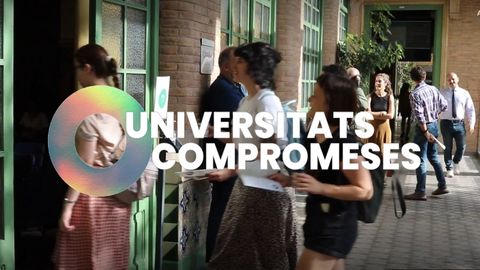Document published to impact policies for university commitment

Based on the conclusions of the working groups at a workshop in July, FAS publishes a political impact document that includes proposals for the university's social commitment to countering climate change and armed conflicts.
04/11/2022
Last July 7, the university community and different representatives of civil society met in the Casa de la Convalescència at the UAB to generate collective knowledge on ways to tackle two urgent global challenges: the environmental crisis and armed conflicts. The workshop, called Committed Universities: University social commitment put to the test by the environmental emergency and armed conflicts, was organised by the Fundació Autònoma Solidària with the support of Barcelona City Council's Directorate of Global Justice and International Cooperation, and focused on strengthening universities' commitment to Global Justice.
To do this, a large part of the day was spent on reflection, based on two different working groups, one on the environmental emergency and the other on armed conflicts. One group focused on the need to implement radical university policies to combat environmental collapse, while the other concentrated on the actions that, from the university community and institution, are required to deal with the human consequences of armed conflicts and to move towards peace. Based on the results of this exercise, the FAS has published a political impact document containing the most important proposals made by each working group.
The working groups functioned as follows: the proposition of long-term goals on the basis of which actions or policies can be devised to ensure their achievement and, ultimately, to propose concrete actions that can be carried out in the short term, which would be the first steps towards broader policies or actions.
Proposals for peace and sustainability
For example, one of the goals set by the Armed Conflicts working group was the achievement of a university that is socially and politically committed to peace and demilitarisation, while pursuing the truth and resolution of conflicts. To achieve this, they highlighted the importance of recognising and strengthening the university's role in institutional activism, and also emphasised that one of the first steps towards achieving this is the organisation of co-creation activities between universities and social agents, and communication campaigns to forge stronger ties between the university and civil society.
Meanwhile, to achieve the long-term goal of a responsible and sustainable university in all of its practices (energy supplies from renewable sources, use of sustainable materials, promotion of eco-friendly internal practices, etc.), the working group on Environmental Emergency and Justice made several proposals for action, including the incorporation of an ethical protocol based on criteria of a social and solidarity economy and environmental sustainability in all outsourced contracts. Some of the first steps could be the creation of an environmental transition technical commission and the termination of contracts signed with suppliers with polluting business practices or that violate human rights.
You will find all the long, medium and short-term proposals in the return and impact document, published in Catalan and Spanish, that has been sent to all the people and organisations that took part in the event. as well as key bodies and authorities at the UAB.
Further information: University social commitment, put to the test by the environmental emergency and armed conflicts in the world. Return and impacy document
This information is related to the following SDG
Peace, justice and strong institutions